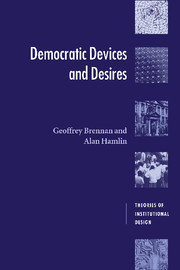12 - The division of power
Published online by Cambridge University Press: 22 September 2009
Summary
All the powers of government, legislative, executive, and judiciary, result to the legislative body. The concentrating these in the same hands, is precisely the definition of despotic government. It will be no alleviation, that these powers will be exercised by a plurality of hands, and not by a single one. One hundred and seventy-three despots would surely be as oppressive as one.
(Federalist papers, 48, James Madison)Divisions, bicameralism and coalitions
In the preceding chapter we defined a division of power in terms of spreading any particular power or bundle of powers across multiple agents rather than concentrating that power in the hands of a single agent. The division of power, so understood, is distinguished from the separation of powers, in that in the separation case a bundle of powers is disaggregated and the separate powers assigned to different agents. Both the division and separation of power involve multiple agents, but separation involves the additional feature that the domain of decision making by different agents is characteristically different. There are, in other words, two distinct dimensions in play here: the one dimension reflecting the number of agents who share any particular power; and the other dimension reflecting the extent to which the particular powers are disaggregated into their separate components. In the previous chapter we focused on the latter, separation dimension. Here we address the former, division dimension.
- Type
- Chapter
- Information
- Democratic Devices and Desires , pp. 233 - 254Publisher: Cambridge University PressPrint publication year: 2000



